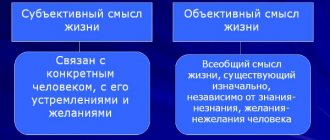Two monks approached the river. A girl standing on the shore asked them to help get to the other side. One took his eyes off the beauty, and the second carried her across the river. Then the monks silently continued on their way. A couple of hours later, the first one burst out indignant: “We took a vow not to touch women! And you... how could you allow yourself to carry that girl in your arms?!” The answer was comprehensive: “I left a man by the river two hours ago. And you’re still carrying the girl.”
Is it worth asking how many of these “women” we carry through life and how we bend under their weight? It’s amazing how these “beauties” haven’t crushed us yet?! Either the burden of grievances and regrets about the past suffocates, or the eyes are blinded by illusions about the future. Sometimes they are so overwhelming that it’s hard to even breathe, you can’t raise your eyes to enjoy life... And the years go by and go and slowly go by.
Is it worth saying for the thousandth time that life is in the moment? It is in this moment, here and now, and not somewhere there! Being physically in one space-time and mentally in another is like eating yesterday’s bread while a fresh, still warm, crispy bun lies in front of you.
Live here and now or live one day: what's the difference?
Sometimes the principle of “here and now” is taken literally: live for today, and tomorrow there will be a flood. This is not true. Conscious presence in every moment of your life is more like the detachment of an observer who sees the whole picture. Yes, the past no longer exists, and the future has not yet arrived. But this does not prevent the observer from analyzing yesterday’s experience and planning his “tomorrow”.
However, if you have at least once tried any of the practices of being present here and now, you have already realized that this is not at all like the habit of living one day at a time.
Stopping attention in the moment “here and now” is the first step to developing awareness. The sensations that you experience cannot be confused with anything: they are often described as a feeling of freedom and happiness, wholeness and fullness of life, reunification with the inner “I”.
Each spiritual teacher explains this state in his own way, since awareness is easier to feel than to convey in words.
In you, as in other human beings, there is a dimension of consciousness that is immeasurably deeper than thinking. It is the very essence of who you are. We can call it presence, awareness, unconditional consciousness.
Eckhart Tolle "What Silence Says"
Self-remembering is inconspicuous. The Higher Self perceives both itself and the observed objects at the same time.
Robert Burton "Self-Remembering"
Watch every action you take. Observe every thought that passes through your mind. Observe every desire that comes over you.
Osho “Mindfulness. The key to life is balance"
What trains, develops - the more you practice mindfulness, training the ability to live here and now, the longer you manage to stay in this state.
Let's get down to the simple steps you can take to get started today.
On the subject: TOP 100 books about the power of thought
Station "Past"
The past... is simply a set of circumstances and events that have already ended, just as the camra in this jug ended. We'll be fine if we try to drink it again! There is nothing to drink there, the jug is empty.
Max Fry
“Many of us first imagine what they would like to do in the future, for example, hold the next meeting,” says analytical psychologist Tatyana Kabluchkova. — When a meeting passes and it’s not possible to do it the way you wanted, the situation that has already happened is replayed in your head. It plays out how everything could have been turned around to have a different outcome. The result is self-attack, melancholy and a sharp decrease in self-esteem.
There is an obvious unconscious barrier to expressing oneself in the present when in contact with other people. When a person is alone with himself - before or after a meeting - he feels well what he wants, what his benefit and goal are in the upcoming contact. For example, negotiations with your boss about a salary increase, or even a conversation with a friend about your own affairs, and not about hers. A person can clearly imagine how he communicates his needs to another and what he does to satisfy them.
But images and ideas are not yet embodied reality, continues Tatyana Kabluchkova. “No one around us sees the images. Therefore, in an imaginary situation, it is not scary to talk about yourself and show yourself as you are. In real contact with another person, your own desire is lost and in its place is put the desire of another, to which you can simply assent, and then you will not be noticed - will not be devalued, will not be rejected.
It is the fear of devaluation and rejection that underlies such conformist reactions. It is rooted, of course, in childhood experience. Parents reacted to each individual manifestation of the child - a request or an active spontaneous action - either by devaluing the need: “Look for what you want!”, or by humiliating him: “Who are you to say such things to your parents!”, or by threatening: “You will do this.” , we’ll leave you here!”
Time passes, but the fear of how others will react to self-expression remains. And everyone with whom you have to communicate in such a way as to say something about your desires is automatically perceived as a criticizing, “beating up” figure,” explains Tatyana. “The pattern of interaction learned in the family is very persistent because it was the only option: it is perceived as normal and there are simply no other patterns of behavior in the imagination.
Some miss their carefree childhood, they are drawn to the city or to the yard in which they grew up. Others constantly remember the time when their children were babies and their parents were vital to them, constantly retelling “childhood stories.” Still others constantly think about past love. Why do people want to go back to their past so much?
“As a rule, such people are prone to depression,” says Mikhail Labkovsky. “They don’t like the life they have now, and they remember their past life. Those who have a hard time living as adults remember their childhood, how carefree, happy they were and how convenient everything was. Elderly people remember how they lived in another time, well, let's say, in the Soviet era. Because they are adapted to that life, they cannot find themselves in another, they feel like superfluous people.
Tatyana Kabluchkova, analytical psychologist
Four steps to conquering “childish” fears of self-expression
The first step is that you need to detect the moment when that very fear appears. You can only change what is visible, what a person is aware of! While this happens unnoticed by consciousness, nothing can be done.
The second step is to feel equal to the person you are going to communicate with. Even if this is a director, he simply occupies one of the positions in this organization, and as a person, as an individual, he has exactly the same rights to his desires as any other person. The position is higher, not the person, people are all born equal.
The third step is to clearly formulate your benefit in a given situation, in a specific conversation, and do and say only what will lead to its implementation.
The fourth step is after the meeting to interrupt the thoughts “Why did I do this and not that” with the only argument: it is impossible to return to the past, this is a physical law. Therefore, these thoughts need to be translated into planning, that is, turned into step-by-step instructions on how to act in the future based on the results of the meeting.
A simple technique “here and now”: read and try it right away!
Practice this technique in a relaxed state, otherwise you won’t be able to be here and now. If you're stressed, try to switch your thoughts to something else. Listen to music, remember a funny joke, take a few slow breaths.
Stage 1. Naming objects
Let your eyes wander and mentally name all the objects you see. This will force your attention to remain here and now, without mentally slipping into the past, but also without running into the future. If you see many identical objects, you can add color to the names. For example, blue car, white car, yellow leaf, green leaf. But it is important not to give them subjective assessments (old, fresh, tall, small, and so on).
Simply record what you see as dispassionately and objectively as possible. Evaluation refers to the past or future, but it is important for us to be here and now.
When this stage starts to work out well, move on to the next one (or do both at the same time).
Stage 2. Feeling yourself in the world around you
Remember yourself - “Here I am, I’m alive!” - and the rest of the world exists separately. Observe the sensations coming from all senses. Here and now, notice the touch of clothing, wind and rain on your skin. Here and now hear the singing of birds, the rustling of leaves, the sounds of the city. Feel the tastes, smells and temperature here and now. Observe the world around you as an alien arriving on Earth for the first time.
A life hack about an alien
is my favorite childhood pastime. I combine it with the practice of mindfulness : this makes it easier to separate flies from cutlets, and the outer world from the inner. Just imagine that you are from Mars, Venus or the Tau Ceti system. You are inside the spacesuit - in your body. Everything outside is a completely separate alien world from you. It’s especially nice to imagine yourself in such a spacesuit here and now , when it’s rain, wind and dirt outside.
This is roughly how newly born children behave when they look at their fingers, remember? Speaking of children...
Mindfulness is familiar to everyone. We just forgot how to do it.
My very first memory dates back to the age at which children do not yet know how to walk - until they are about a year old. I'm in a nursery, lying in a crib with bars and watching two nannies in white coats. Now I barely remember what they talked about, but it’s not that important. And it is important that at that moment I was in a state of awareness, clearly and impartially recording events. I realized this many years later, when I began to learn to be here and now. It turns out that we really can do all this, we just need to remember.
Stage 3. Turning off internal dialogue in the “here and now” state
Some time after completing the first two stages, you will have a feeling of emptiness and such freshness in your head, as if it had been ventilated. Well, or just an unusual condition. This is a signal that you are doing everything right on the path to awareness. In this case, the internal dialogue will turn off by itself (it may not work the first time - be prepared).
By the way, don’t try to do anything with extraneous thoughts. It is useless to fight them, and trying to observe them, as many spiritual mentors recommend, is not so easy.
Thinking cannot be stopped - not that it does not stop, but it cannot be stopped. It stops on its own. This difference needs to be understood; otherwise you may go crazy chasing your own mind.
Osho “Mindfulness. The key to life is balance"
On topic: Osho. Courage: the joy of living at risk
Don't pay too much attention to your thoughts, and they will actually begin to disappear on their own over time, once you become more familiar with the practice of “being here and now.”
At first, you may find it difficult to maintain a state of mindfulness for a long time. Don’t worry if during your first attempts you will be “knocked out” into normal life within a minute. Set yourself a goal: gradually increase the frequency and duration of sessions.
Set an alarm on your phone for 4 times a day (or more) to help you remember to practice and track your results.
Get free instructions on how to make your wishes come true while access is open >>>
And one more life hack, this time from Robert Burton:
Paradoxically, one of the best ways to prolong self-remembering is to not try to hold onto it. When unusual productive states arise, try to evoke within yourself a working self that says, “So be it.”
Recommendations
1.Why?
Every time you realize that you are hanging on events that happened a long time ago, ask yourself why you need this? Why, for example, have you held on to the idea for years that men are the same and nothing good will happen around them? Because there was a negative experience in the past? Or are you satisfied with your loneliness and just find such an excuse? So, to be here and now is to be honest with yourself, it is to be ready to take risks to live, which means trying again and again, or accepting yourself as you are.
2. We must learn one truth - everything changes
And so do we, every day. And if yesterday I said that someone is incredibly dear to me, then today he may no longer be so significant to me, and this does not mean that yesterday I was lying. Everything just changed today. What I mean is that you should be able to notice yourself and allow yourself to be. Life is not static, it is in constant dynamics and movement, so you shouldn’t “punish yourself” for changes.
3.Feelings of self
To notice yourself in reality, you must perform many functions at the same time, so to speak, be Julius Caesar. What does it mean? And the fact that in addition to the surrounding reality, you should also discover yourself, that is, your thoughts, feelings, sensations in the body, audible sounds. It is not simple. Especially so as not to tie it all to past experience. Take it gradually, and over time you will be able to balance all the incoming information.
For example, set aside 15 minutes a day to do this exercise: sit on a chair, and for 5 minutes just look, silently saying to yourself everything you see in front of you, around you, starting the phrase “I see.” You'll be surprised how many details you haven't seen before. Then also, just concentrating on the sounds. And finally, you will need to listen to the sensations in your body, feeling every centimeter of it.
By the way, meditation helps me with this. You can read about it here.
4. Finally, give up the method of putting everything off until later
After all, how can you learn to be in the present when you deprive yourself and ignore your needs? This tomorrow may well not come, or may not be relevant. This also applies to shifting responsibility, or rather, trying to avoid it by making promises to yourself to change from Monday. Got an idea to do something? Then immediately take action, otherwise it is unlikely that your plans will become reality.
Have you bought a beautiful set? Use it now and have fun, the same goes for the rest, waiting for the right opportunity. You are responsible for your life, and you have the right to organize various events in it.
5. Listen to yourself right now, what do you want?
And how realistic is this desire to realize at the moment? What do you get pleasure from? How do you relax? Now remember, when was the last time you allowed yourself to relax and do exactly what you wanted?
6.Replacement of reality
I would like to strongly recommend that you get rid of the habit of “hanging” on the Internet, “disappearing” while watching TV. These are killers of your time, which disappears unnoticed. Look around - the present is sometimes not as beautiful as in the virtual world. I have already written an article on this topic “What to do if your life is spent on social networks and how to overcome this problem?”
7.Process
Your high ambitions and motivation to achieve are wonderful, but it is very important to enjoy the process, so you should not focus only on the result, learn to pause and notice, do you like what you are doing? And if not, then make an effort to find an opportunity to enjoy your activity, to find something good and pleasant in it.
8.Little secret
If you remember, in the article about aerophobia, I suggested using a money rubber band on your wrist to switch from irrational fears, returning to reality. This method also turns out to be effective in cases of excessive fantasizing and avoidance of the present. So, every time you notice that you are not in the moment, but somewhere far away, pull back the elastic band and let go, so your consciousness will switch, and your body will cheer up.
9. Judgments
By the way, recently, in an article about the deductive method of Sherlock Holmes, I talked about the importance of without value judgment, that is, when we simply observe and do not give a subjective assessment of what is happening.
10.Practice before bed
Every evening, before going to bed, try to highlight and name 10 things that happened to you during the day and caused pleasant emotions. Perhaps you did not attach importance to some events before, because human nature is such that he notices the importance of processes only when they stop working. We don’t have to go far, we are not aware of our breathing, although if we block the access to oxygen, we will understand how vital it is for us.
This is very good practice. Personally, I did this: every night before going to bed, I remember 5 things I have done for which I am grateful to myself. And then I tell myself 5 things that the next day I will do better than ever. I wrote more about this in articles about my goals. Here is a link to the section with all the articles and reports about my achievements of goals.
What happens if you exercise four times a day?
The topic of mindfulness is being actively discussed online, and I recently came across this question:
– How do I understand if I’m really
here and now , or if it just seems to me?
It is very easy to determine this if you have criteria - what results to expect from this method and when.
Try regularly practicing the suggested “here and now” technique, just four times a day. Within the first week you will discover something like this (perhaps in this order):
- Stress levels will decrease
This exercise once pulled me out of a severe depression in just one set. Those who have experienced depression will appreciate how great it works.
- More energy
There are many options to recharge your energy, but it is the mindfulness mindset that I use most often, because this method is simple and accessible. And, as a bonus, your mood rises and a feeling of happiness comes.
- You will become clearer about what you want from life.
Being in the “here and now” moment, you may find that your previous goals no longer warm you, and the focus of attention has shifted to something else. This is exactly what happened to me, by the way. Thousands of people attend trainings and buy books to understand their purpose. And you just need to look inside yourself - into your spacesuit...
- Glimpses of intuition will appear
For example, as soon as you think about a certain person, suddenly he calls or accidentally meets on your way. Don't treat this as a coincidence. This is exactly how the first steps towards great changes begin!
Living here and now is much more interesting. If you use public transport, you will soon start “ordering” the bus you need. If you have a car, a space will be freed up right before your arrival, even in a densely occupied parking lot.
On topic: Mindfulness is the key to living in balance
To do something well, stop thinking about it
Giphy.com
We often feel like others are evaluating us every minute. For example, in a dance lesson you cannot relax because you know that you don’t know how to dance and you look funny in the eyes of others. Fear of judgment prevents people from trying new things. But every person is too busy with themselves to constantly celebrate your failures.
If something really scares you—speaking in public, having to talk on the phone to a stranger, or going to the gym for the first time—don't focus on it. This will only increase your fear.
Try to focus less on yourself. Pay more attention to what is happening around you. Recognize yourself as part of what is happening, and not the only actor. This will help you cope with emotions and react correctly to the environment. This way you can work on your weaknesses.
How Mindfulness Attunement Works
It's simple: when we stop worrying about the events of the past and worrying about the future, the stressful state disappears by itself, like the morning fog. It just doesn't have the fuel anymore.
When we are here and now, the mental mixer in our head turns off and a huge amount of energy is released. This energy does not disappear into emptiness: you feel it as cheerfulness, a thirst for activity and a good mood.
When we immerse ourselves in contemplation, even more amazing things happen:
If you just sit and observe...over time your intuition blossoms and you begin to see things more clearly and be more in the present. Your mind just slows down and suddenly you see a huge space. You see a lot more than before.
Steve Jobs
A state of awareness, presence here and now, turning off internal dialogue - all this is the same proven way to open the door to your Subconscious. Of course, this area is in many ways still Terra incognita, but we can use some properties of the subconscious today.
Your memories determine how confident you feel in the present.
If your morning was productive, chances are your entire day will be successful. Conversely, if you hit and snooze your alarm multiple times to give yourself an extra 15 minutes and end up not getting anything done that you planned for the morning, the rest of your day won't be great either.
The emotions that memories of the past evoke in us largely determine how confident we feel in the present moment. So, if you do things now that will make you proud in the future, you increase your likelihood of success in the future.
What our Subconscious can do
Imagine a car with a driver at the wheel and a navigator that says in the voice of Fyodor Bondarchuk: “There are road works ahead in the left lane” or “You have gone off route, this is not according to the script.” So, if you compare your body to a car, then your mind (or your consciousness) is the driver who sits behind the wheel. And your Subconscious can be considered a navigator, which sees all the paths and knows how to achieve the goal.
If you know how to live here and now, then the Subconscious will always tell you the right route and help you reach the Universe.
On the subject: How the subconscious controls your life
Happy today
The present is the only thing that no one has yet managed to escape. But how difficult it can be to accept this fact! Gestalt therapy will help here, aimed at ensuring that a person discovers previously suppressed feelings in himself, accepts them and trusts them. Emotions and needs hidden from oneself, as well as emotions that were previously suppressed or not recognized, often come to the surface. The main idea of therapy is not to worry about the past and not to be afraid of the future, but to live and act fully today.
How does the “here and now” state manifest itself? Examples from life
I promised to share personal examples of what the first results of the practice of being present here and now can be. Here they are.
Story No. 1. Reading information from outside
I mind my own business and don’t bother anyone. Suddenly, a first and last name - completely unfamiliar - come to mind from somewhere. A couple of hours later I find myself next to the TV and the “News” sadly reports that an actor with the same name and surname has died. I had seen the actor somewhere before, but I didn’t know his name.
This incident struck me greatly, which is why I remember it. In general, when you begin to be here and now, answers to questions that currently haunt you come in a similar way. They just appear in your head, literally out of nowhere, and that’s it. Watch this.
Story No. 2. Sharpening intuition
I'm in the supermarket, looking for a bag of nuts. There are all kinds of snacks on the shelves, but mine are gone, they're all gone. And I desperately need these nuts, right here and now. And suddenly a certain state, previously unknown to me, covers me, and my hand somehow, by itself, with a precise movement, reaches deep into the shelf, pushes the bags apart and pulls out the penultimate one.
Have you guessed it yet? These were the same nuts. And they were the only ones on the shelf, I checked - they got stuck in there by accident. My mind couldn't know about it. But intuition knew.
Story No. 3. Fulfillment of desires
My wish was a luxurious manicure. I usually make an appointment with my favorite master in advance. But then the family budget was so tight that there was no money left for a manicure. “Next time...” I thought. "Here and now!" - decided the Universe. And I instantly receive an offer to do a manicure four times cheaper than usual, because the master needs a model to practice a new technique.
This is how wishes gradually begin to come true. At first modest, everyday ones. Then - be bolder.
So what is next…
Station "Future"
90% of our worries are about things that will never happen. Margaret Thatcher
The heroine of the Brothers Grimm fairy tale of the same name, Clever Elsa, when Hans wooed her, went down to the cellar to get beer to the table, noticed a pickaxe on the wall and began to think about the future.
She immediately imagined how she would marry Hans, how they would have a child, how they would send him to the cellar for beer and how this pickaxe would fall on his head and kill him, and began to cry about the impending misfortune. This often happens in real life: people worry about the most negative scenarios for the development of upcoming events that their imagination could draw.
“Nothing bad is happening to a person now, no one has died, but he is already starting to think about it, instead of just continuing to live, looking for opportunities to avoid a negative scenario. This is what distinguishes a neurotic from a healthy person. A healthy person reacts to real things, but a neurotic person reacts to non-existent ones,” explains Mikhail Labkovsky.
In Soviet times, many were raised this way. It was necessary to think about tomorrow and the day after tomorrow. Many are accustomed, denying themselves the most necessary things in the present, and putting off all the best things for later: a tea set for big holidays, money for some upcoming event or in case they are needed in the future for a rainy day.
“People who live in the future, in the fact that something will happen someday, are anxious people,” continues Mikhail Labkovsky. — Anxiety makes them worry about tomorrow all the time. They are afraid of the future, they are afraid that they will be old and there will be no money, or that children will appear and there will be nothing to feed them, or that they will lose their job.
If you want to worry, ask yourself what is threatening you right now. In life, of course, disasters, illnesses and financial crises happen, but this is not a reason to live like a cowardly hare all your life. A crisis will come, and then you will fight it moment by moment, says Andrew Matthews, author of the book “Happiness Here and Now.”
Mikhail Labkovsky, psychologist, television and radio presenter
Just live and enjoy life here and now
The pleasure of life is the meaning of life. When people cannot enjoy life, they invent world revolutions, careers, making money, and something else. Many people just do something all the time. They don’t live, they solve problems all the time and plug holes. This happens when a young family somehow lives and lives in a problem, then suddenly - money appears, a house appears. What to do next? And then one of them realizes that they don’t love their spouse, don’t want to live with him, and in general they are different people.
When you can’t live like that simply, one of the main reasons is anxiety. It completely destroys a person’s ability to enjoy life. Therefore, the first thing you need to do is deal with your worries and fears. If they are behavioral, go to a psychologist; if they are clinical, go to a psychiatrist. If your problem is that there are no desires, this is asthenia - a decrease in vitality. This also requires some kind of treatment from a psychologist or doctor.
What will happen to you next?
If you practice the ability to be here and now every day, then over time, moments of awareness will begin to arise spontaneously and more often. You no longer need to play the game “name the object”: the sensations will become stronger and more beautiful without it.
Subsequently, you will learn to enter the presence mode here and now literally on the go and even during a conversation. Imagine, you were called to a showdown with your superiors, and you are calm, like Buddha. You watch the whole conversation from the side, like Fyodor Bondarchuk in a navigator - there’s an accident, and there’s a traffic jam, we’ll go around here. And it’s no longer the boss who controls the script, but you.
When I first started being present, I couldn't speak and be present at the same time. It took a while before I learned how to do this.
Robert Burton "Self-Remembering"
Taking care of the past allows you to build your ideal future
In his famous book, The Seven Habits of Highly Effective People, Stephen Covey advises starting something with a clear vision of the end result. To do this, he invites the reader to imagine celebrating his 80th birthday. At this party, all your loved ones should tell you how wonderful you are, express their feelings towards you, and toast to you for living your life well.
Imagine that you have received many compliments from your loved ones. What exactly would you like to hear about yourself and your life? What would they have to say about your character and your role in their lives? What accomplishments of yours would they like to remember? How have you influenced them?
According to Covey, keeping these questions in mind requires making decisions in the present. And this is completely justified.
In fact, the concept of “living in the moment” does not take into account the very nature of time. The past, present and future are not clearly separated from each other. One of them smoothly passes into the other. A mistake in the present instantly becomes a mistake in the past. It also affects your future.
An optimistic conclusion can be drawn from this. We can build exactly the future we want. And, just as important, we can have the past we would like to have. And be proud of who we have become.
Important nuances
- Notice random coincidences
When you are in the “here and now” state, accidents are not accidental. There is such an observation: if you do not listen to the prompts of intuition and do not rejoice at the gifts of the Universe, then this source will dry up over time. By the way, it also works in the opposite direction.
- Be sure to raise the bar
Be prepared that the changes will be small at first. Gradually increase the duration of practice and the number of approaches per day. The skill of mindfulness is trained like triceps or Brazilian glutes - that's a fact.
Awareness grows very slowly, but it grows. A person must be very patient.
Osho “Mindfulness. The key to life is balance"
Take a master class on fulfillment of desires from Elizaveta Volkova and find out what can interfere with the fulfillment of your desires >>>
Safety precautions for practice “here and now”
You can learn to live here and now while walking, in the gym, at business negotiations, on the subway... almost everywhere! But you can't do this while driving.
While you're stuck in traffic, exercise for your health. But it’s definitely not worth it while driving. It is generally not advisable to do any practice while driving. By the way, I tried to be here and now behind the wheel. I do not advise.
Being in an “alien state”, it is impossible to predict the development of the situation on the road. But this is exactly what the driver needs. If you wait for your trained intuition to start steering for you, then you simply won’t be able to wait.
Set your priorities
One of the problems that prevents us from achieving our goals is the difficulties we think about. We often think we have to do something when we don't. Think about whether you do something without desire, without seeing the point in it, just out of habit.
Is this really necessary or useful? To figure out what is important in your life, use Pareto's law - 20% of your actions bring 80% of the results. Find out what exactly that 20% includes and pay more attention to it, and take a fresh look at the remaining 80%. Try to invest less time and effort into them, making room for something useful.
Make a plan so that nothing distracts you. Write down all your affairs in detail. This way you will no longer have to be distracted while working and remember what else needs to be done. You can use the simplest planning. The main thing is that it is sufficiently detailed.
Let's sum it up...
So, to learn to live here and now, you can start with the simplest steps. Not caring whether it works or not. Without being upset that attention floats to the side. Just do it every day, slowly raising the bar.
What else? Constantly monitor results. It will be great if you start writing them down. Re-read your notes in a year - and you will feel like a magician and wizard.
And it doesn’t matter whether you “ordered” the right bus or whether your intuition worked and you arrived at the stop when it arrived. Record any results and train the “here and now” state regularly. Then, over time, more complex practices will become available to you, very serious desires will begin to come true, and in general your whole life will change!
Write in the comments whether you are able to live here and now and what sensations arise in the process - this is important to track.
To get the most out of time, lose track of it.
When you are absorbed in an interesting activity, you stop keeping track of time. This happens when we enjoy what we do. We also don’t count time when we sleep. But you can’t just throw yourself into an activity without wanting to, so it’s important to create optimal conditions for such activities.
Choose an interesting goal that will teach you something new. It shouldn't be so hard that you feel stressed while moving towards it, and it shouldn't be so easy that you feel bored in the process.
Why else is it so necessary to be in the Now?
Because life is the only one, beautiful, unique, with its enchanting moments, on which, like in haiku, you can stop your gaze, admire, penetrate into them, understand something very important - it, this life, is only in the Now. And it’s so important, and it’s so necessary, and it’s so valuable to notice moments. Because it means noticing life, and in essence, living.
Just pay attention: you are walking along a spring street, young grass is under your feet, the first sticky greenery has just opened its leaves, the buds on the trees are still preparing to explode in a riot of flowering... And you are walking along this beauty, immersed in thoughts about yesterday’s conflict with a work colleague, or about sorting out the relationship with your loved one (and it’s good if you love it :)), or about a set of products that now you need to go and buy in the supermarket, and then what is best to cook from them... And we walk down the street - and we don’t see anything from of what IS, we do not see the shades, nuances of nature, we do not hear its voice, depriving ourselves of all those main little things that are not really little things, because without them it is impossible to feel the bouquet of the taste of life...
Awareness of “I am the Truth” is possible only Now
And now we come to the very main thing... In fact, to what is the goal of many practices, painful searches, painful experiences... of course, not all, but those who seek. Or rather, who recognizes himself as Himself under all this heap of layers of personality, under the multitude of everything that is “not Me.” And I - where is it, what is it? And it's here. And this is the truth of your being. Truth, which is “absolute existence-awareness-bliss, supreme peace and omnipresence, which is beyond any concept, imagination and description.”
It cannot be described, it cannot be retold, it cannot be conveyed, but it can be suddenly felt... it can be spontaneously experienced. By entering... by breathing... by touching... by expanding... by allowing...
There are no identical experiences and there are no recommended ways of experiencing the truth, but one thing can be said: if someone is lucky enough to feel the touch of it, such that there are no questions left at all, and you yourself are the complete, unified and all-encompassing knowledge of All That Is... then this is only possible in the Now. And, perhaps, this is the most important thing about the “Now” moment, which can only happen to you “Here” - at the point of development where you have now arrived, at the point in space where you are now.










